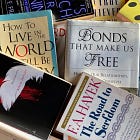Two Minutes of Jew Hate
Hate needs an object. No doubt, if the Jew haters killed every Jew in the world, they would soon be coming for any of us.
All you need to know about the sickening Jew hate seen at Eurovision and on college campuses is exposed in 1984.
In George Orwell’s 1984, the population is required to engage in a daily ritual called Two Minutes Hate. The Party’s enemies, often Emmanuel Goldstein, are made to seem grotesque. Party members are mandated to rage at these hideous scapegoats:
The next moment a hideous, grinding speech, as of some monstrous machine running without oil, burst from the big telescreen at the end of the room. It was a noise that set one’s teeth on edge and bristled the hair at the back of one’s neck. The Hate had started. As usual, the face of Emmanuel Goldstein, the Enemy of the People, had flashed on to the screen.
Goldstein is perceived as the biggest enemy of the state. Orwell describes the ritual of the daily rage:
The horrible thing about the Two Minutes Hate was not that one was obliged to act a part, but that it was impossible to avoid joining in. Within thirty seconds any pretence was always unnecessary. A hideous ecstasy of fear and vindictiveness, a desire to kill, to torture, to smash faces in with a sledge hammer, seemed to flow through the whole group of people like an electric current, turning one even against one’s will into a grimacing, screaming lunatic.
Tellingly, Orwell writes, “[T]he rage that one felt was an abstract, undirected emotion which could be switched from one object to another like the flame of a blowlamp.”
Read Orwell’s observation carefully: The Party depends on its ability to tap into pre-existing rage. Individuals blinded and bonded by rage are easily controlled by the state.
Today’s “Party” is in opposition to Western civilization, and they need an object for their hate, in this case Jews.
A universal truth about human minds is revealed in 1984. In Stephen Covey’s words, “We see the world, not as it is, but as we are—or, as we are conditioned to see it.”
We interpret what we see through our beliefs, thoughts, and feelings and mistake our interpretations for reality. We don’t realize, as Covey puts it, that “When we open our mouths to describe what we see, we in effect describe ourselves, our perceptions, our paradigms.”
Hate must be recreated moment by moment in a person’s mind or it will eventually extinguish itself. Constant marches and rhythmic chants keep the hate going. On the other hand, love is timeless because its source is infinite beyond the human mind.
Hate needs an object. No doubt, if the Jew haters killed every Jew in the world, they would soon be coming for any of us.
We can’t help but hate ourselves for our mistreatment of others. This is so because in everyone’s mind is a memory, however dim, of our connection to all of humanity.
Who among us wants to see ourselves as a rager? We want our rage to be someone else’s fault.
At Eurovision, the booers of the twenty-year-old Israeli contestant, Eden Golan, will tell you that they don’t hate Jews, only Israel, only Zionism. They got in their two minutes of hate. But I know enough about human nature to tell you the haters are feeling the hangover. Hate is in their mind, and the more they hate, the more they suffer.
To steady her nerves, Golan practiced performing in front of people encouraged to boo. When not performing, to keep the rageful mob at bay, Golan was forced to remain in her hotel room guarded by Israel’s Shin Bet as well as Swedish, Danish and Norwegian police.
Other contestants bullied Golan. One, the self-proclaimed “queer witch” Bambie Thug (the Irish entrant at Eurovision), told us she was motivated by love.
I’ll spare you the complete blow-by-blow of hatred at Eurovision. Laura Dodsworth has an excellent summary and happy news of Golan’s strength among the public (non-juried) voters.
I think you can guess who Bambie Thug is and who Eden Golan is.
Dodsworth, herself not a Jew, recently wrote an excellent essay about why “we should all be Zionists.” If you are being swayed by the propaganda that anti-Zionism is not Jew-hatred, her essay is a must-read.
Iranian-born Amir Pars beautifully elucidates how he went from Jew hater to Jew admirer and why “anti-Zionism is antisemitic.”
To make the transformation Pars did, a person must be willing to look at their hate however deeply it is buried. This is something most Jew haters are not willing to do.
“Wherever tyranny is strongest…attacks upon the Jew are most mercilessly atrocious.” Rose Wilder Lane, daughter of Laura Ingalls Wilder
Your support for my essays is greatly appreciated, and it gains you access to Mindset Shifts U. We are currently working through Man’s Search for Meaning, and later in June we will begin Bonds that Make Us Free.







Love how you put Orwell's observation in this article,
The Party depends on its ability to tap into pre-existing rage. Individuals blinded and bonded by rage are easily controlled by the state.
False paradigms and false dichotomies specifically designed to keep you at odds with your fellow human beings.
Who benefits the most from separating people from compassion and empathy?
Effective psychological manipulation via divide and conquer narratives and dehumanization propaganda makes people lose compassion and empathy for their fellow human beings because now they've been categorized as "other" or "less than"; allowing not only for the abuse of human rights and civil liberties of those marginalized individuals, but to also facilitate the future oppression of those that would allow it. Apply this logic to any "Us vs Them" rhetoric and you immediately recognize it for the trap that it is.
Because we've been conditioned to view these people through a lens of dehumanization, that somehow their arbitrary differences or extenuating circumstances make their lives any less valuable than ours, these kinds of faux political debates are the result.
This kind of rhetoric that we have been constantly subjected to, much like how lies on repetition come to be accepted as truths, have seemingly divorced us from a fundamental part of ourselves — our humanity.
In times of hardship we rush to the side of our loved ones in need without hesitation. Amid natural disasters strangers often flock to render assistance to one another with no thought of what may be gained in return
Our humanity isn't lost. It's apparent when we're put in circumstances that cause us to view others as our equal. We've just been made to forget it at times. It is made to be so buried under the biases, and the prejudices, and the dogmas of tribalist thinking that we lose sight of it.
We regain our humanity, our empathy, and our compassion for others by seeking to understand them.
Though that still requires work on the part of the individual. A willingness to set aside preconceived notions and look beyond manufactured prejudices. To look inside of oneself and come to terms with one of the oldest philosophies known to man, one that we are all taught when we are children; to treat others how we wish to be treated.
It requires a conscious effort to be open to new ideas and to view things from alternative perspectives. And to realize that we have far more in common with each other than the small subtleties that separate us.
ps the 2 mins. of daily hate are quite effective! This, sadly, jus' heppened a 12 min walk from my ol' neib in Brooklyn... 2 orthodox young boys, 12 & 13, brutally beaten (crime: bein' chews, outside)... no way they'll git the perps-- there's footage but of course folks'll tell ya it's "AI" an' made up...
https://www.jpost.com/international/article-801437